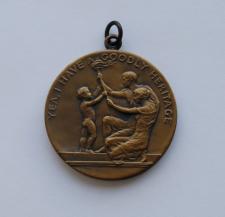Aggregated News

On August 17, 1920, the Topeka Daily Capital reported an exciting development: a new class of competition had been added to the livestock judging categories at the Kansas Free Fair. Class 2.603, part of the Division 203, “Human Stock,” allowed families to submit themselves for judging by the fair's eugenics department. If they were deemed the most pleasing specimens at the fair, they would win the title of “Fitter Family.”
Though the category was new, the judging of humans according to the principles of eugenics wasn’t a novel concept in 1920. For at least a decade, state fairs across America had been holding “Better Baby” competitions, in which infants were examined, measured, compared to growth charts, and awarded trophies for good health and genetic superiority. University of Michigan history professor Martin S. Pernick writes that such contests “rivaled livestock breeding and hybrid corn exhibits in popularity.”
Fitter Family competitions, which spread from Kansas across America during the 1920s, were an extension of the Better Babies idea. The advantage of examining older children and adults was that, unlike babies, these specimens could talk back. They also...



